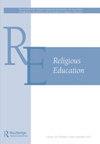跨信仰倡议中的学习取向:以跨信仰领导项目Emoena为例
IF 0.4
3区 哲学
0 RELIGION
引用次数: 0
摘要
本研究考察了参与者在跨信仰领导项目Emoena过程中自我报告的学习取向。参与者带着一系列不同的期望和动机开始了这个项目,这影响了他们在整个项目中获得的见解和面临的挑战。通过对被试反思报告的归纳分析,我们区分出四种不同信仰间学习倾向:1)识字导向学习、2)连接导向学习、3)能力导向学习和4)反思导向学习。更多地了解这些学习取向将有利于课程设计者选择相关的学习活动,并将指导未来对不同信仰间学习的复杂动态的实证工作。本文章由计算机程序翻译,如有差异,请以英文原文为准。
Learning Orientations in Interfaith Initiatives: A Case Study of the Interfaith Leadership Program Emoena
This study examines participants’ self-reported learning orientations over the course of the interfaith leadership program Emoena. Participants started the program with a range of different expectations and motivations, and this influenced the insights they gained and the challenges they faced throughout the program. Based on an inductive analysis of participants’ reflection reports, four interfaith learning orientations were distinguished: 1) literacy-oriented learning, 2) connection-oriented learning, 3) competency-oriented learning, and 4) reflection-oriented learning. Knowing more about these learning orientations will benefit curriculum designers in choosing relevant learning activities, and will direct future empirical work on the complex dynamics of interfaith learning.
求助全文
通过发布文献求助,成功后即可免费获取论文全文。
去求助
来源期刊

RELIGIOUS EDUCATION
RELIGION-
CiteScore
0.90
自引率
28.60%
发文量
46
期刊介绍:
Religious Education, the journal of the Religious Education Association: An Association of Professors, Practitioners, and Researchers in Religious Education, offers an interfaith forum for exploring religious identity, formation, and education in faith communities, academic disciplines and institutions, and public life and the global community.
 求助内容:
求助内容: 应助结果提醒方式:
应助结果提醒方式:


